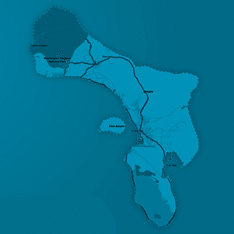Bonaire
Bonaire is a southern Caribbean island located off the coast of Venezuela. The island is considered a diving paradise and well known under divers enthusiasts all around the world. Bonaire is also a natural sanctuary to countless flamingoes.
Political Status
After the dissolution of the Netherlands Antilles on 10 October 2010, Bonaire became a public body (comparable to a Dutch municipality) within the country The Netherlands. This is also the case for the islands of St Eustatius and Saba. The three public bodies within The Netherlands are referred to as the BES Islands. The citizens of all the constituent countries within the Kingdom share one nationality, which is Dutch.
Although not a self-governing entity within the Kingdom, local affairs are governed by an appointed Mayor (gezaghebber) and the Executive Counsel, members of which are appointed by the elected Island Counsel.
Legal System
The Netherlands, which Bonaire is a part of, is a civil law country, meaning that its laws are written (codified) into a referable system, which forms the primary source of law. The main source of private law is the Civil Code BES, which comprehensively deals with matters related to business, contracts and liability. The Civil Code BES is still to a great extend modeled after the Civil Code that was applicable in the Netherlands Antilles before it was dissolved.
The legal jurisdiction lies with the Court of First Instance of Bonaire, St Eustatius and Saba, the decisions of which may be appealed to the Joint Court of Justice of Aruba, Curaçao, St Maarten and of Bonaire, St Eustatius and Saba. Decisions of that Court may in turn be appealed to the Supreme Court of the Netherlands in The Hague.
Economy
The Economy in Bonaire is mostly driven by the tourism industry. Other activities include oil transshipment and the extraction of salt from seawater.
